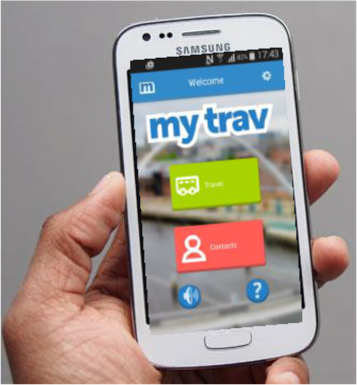KMS Solutions is working with Manchester Metropolitan University and Stockport Memory Clinic on a project designed to help people living with dementia.
Wearable technology, satellite tracking and mobile phone apps are the latest tools in the fight against social isolation from dementia, unlocking the potential for increased independence.
Researchers at Manchester Metropolitan University, working with Stockport Memory Clinic and Manchester-based KMS, are analysing these technologies to establish their best use for people with dementia and for their carers.
KMS Solutions provide a range of new, easy-to-use mobile technologies that can support people living with dementia and their carers, comprising of an Android smartphone application ‘MyTrav’ app, and two wearable and portable GSM/GPS based wristbands.
 KMS SOlutions’ ‘MyTrav’ app
KMS SOlutions’ ‘MyTrav’ app
Josie Tetley, Professor of Nursing in ageing and long-term conditions at Manchester Metropolitan University, said: “We will work closely with the end people living with dementia and their carers. The use of the different technology options will be studied in the daily lives of a small group of research participants to analyse the potential acceptability and usability of them.
“Based on this, the project will analyse the potential of these technologies to reduce social isolation and improve health outcomes.”
John Hearns, MD of KMS Solutions Ltd, added: “The technologies we have developed can support independent living in the community by enabling the person living with dementia to move independently in safe areas, the carer to locate them using GPS tracking and the person with dementia or their carer to contact each other in case of an emergency.”
Carol Rushton, clinical lead from Stockport Memory Clinic at Pennine NHS Foundation Trust, added: “Going for a walk can sometimes be a challenge for people with dementia because of memory issues and confusion related to their dementia which can lead to people getting lost or disorientated even in familiar surroundings.
“These distressing experiences for some can result in reduced activity, increased social isolation and increased carer stress, so any form of technology that can support people get out and about more safely and confidently would be a great help.”
In 2015, it was estimated that there were 850,000 people living with dementia in the UK. As a result of the memory, physical and communication challenges, people with dementia and their unpaid carers may experience social isolation and loneliness.
It is part of a series of technical health projects at the university designed to employ new technologies to cut loneliness and isolation.
The project is funded from Greater Manchester Academic Health Science Network’s Technology Innovation Challenge.









